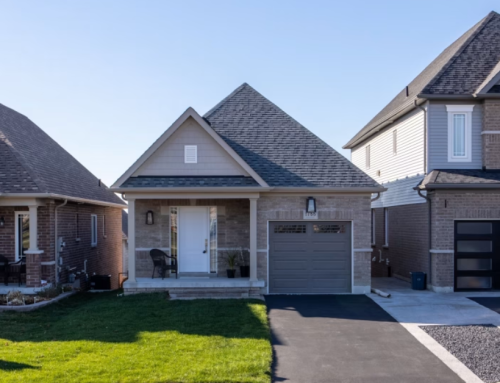Housing was a hot topic in the weeks leading up to April’s federal budget, with more changes announced on budget day.
The Liberal government made a number of announcements about housing prior to the budget, culminating in the release of a 28-page plan called “Solving the Housing Crisis.”
The steps in that plan were included as part of the 2024 Federal Budget, along with other announcements that impact those involved in the business of housing.
We’ve dug into the details of the Federal Budget and the Housing Plan to prepare a two-part series, looking at the impact on those in the business of building and renovating homes and rental properties. This is our look at the Housing Plan. Find out more here about the 2024 Federal Budget.
The 2024 Federal Budget’s Housing Plan
The Liberal government calls their housing plan their “plan to solve the housing crisis,” including steps they will take, and calling on action from other levels of government as well as those who build homes.
The plan includes promises to spend billions of dollars, along with other incentives and changes, divided into three categories:
- Building More Homes
- Making It Easier To Own Or Rent A Home
- Helping Canadians Who Can’t Afford A Home
Each category has a few action items, many of which impact individual homebuyers. Some of them require action from other levels of government.
We’ll look at those clauses that impact those in the housing business, those flipping houses, rental property owners, or those involved in projects to BRRR—Buy, Renovate, Rent, Refinance. What does the 2024 Federal Budget and its housing plan mean for real estate investors, homebuilders, or those looking to renovate properties to rent?
Building More Homes
The first category of the plan has the biggest impact on real estate investors. The government wants to build more homes at a faster pace, “from concept to construction.” To do that, they are promising incentives for builders, encouraging the construction of certain types of buildings for renters, like apartments or multiplexes, and encouraging municipalities to improve zoning and permitting processes.
Here are the individual clauses that could have an impact on real estate investors, rental property owners and homebuilders.
Accelerated Capital Cost Allowance for Apartments: This is deemed a “temporary” tax measure that will increase the capital cost allowance rate from 4% to 10%. This is intended to create an incentive for builders of “new purpose-built rental projects” by increasing their after-tax return on investment.
Providing Low-Cost Loans to Build Apartments for the Middle-Class: This is an expansion of the federal government’s Apartment Construction Loan Program, which provides low-cost repayable loans to builders and developers. Budget 2024 has proposed another $15 billion in loans to build a minimum of 30,000 new rental apartments.
There’s also a promise to make the program easier for builders to get more projects done, such as by adding a portfolio approach so builders can move forward on multiple projects at once, and launching a new frequent builder stream to fast-track the application process for proven home builders.
Building Homes on Top of Shops and Businesses: This initiative allocates at least $100 million in low-cost loans from the Apartment Construction Loan Program—mentioned above—to build above existing shops and businesses across the country. This and other components of the government’s plan are to address the fact it’s easier to build where infrastructure already exists.
Offering Low-Cost Financing for Homeowners to Add Additional Suites:
This is intended to help homeowners with extra space they could convert into a rental suite, such as an unused basement or a garage that could be converted into a laneway home. This could help rental property owners too, which in turn helps to address the housing shortage.
The budget proposes a new Canada Secondary Suite Loan Program, to be delivered by the Canada Mortgage and Housing Corporation, to allow homeowners to access up to $40,000 in low-interest loans to add a secondary suite to their homes. Limited information has been released on this program so far
This type of change goes hand in hand with zoning reforms and the removal of municipal red tape that has traditionally prohibited such development.
Although full information is not available, we believe this will be allowable for rental property owners and homeowners and could be a great way to access financing for BRRRs. We will monitor this and share information as it becomes available.
Further Incentivizing Density to Existing Homes: Similar to the previous initiative, this one aims at providing new opportunities for homeowners to redevelop properties to add density. This could be in the form of adding a secondary suite or entirely rebuilding what was a small bungalow into a triplex with home for three families.
In conjunction with recent municipal zoning reforms in Canada’s major cities, the federal government wants to make targeted changes to mortgage insurance rules. This could allow homeowners to make those changes to their home by increasing the applicable insured mortgage limit.
Working with Other Levels of Government: The budget also speaks to restrictive zoning practices, excessive red tape, and outdated processes, all of which stand in the way of building approvals. The government wants to work with provinces and municipalities to improve their zoning and permitting processes, and adopt changes to the National Building Code.
The federal government wants to help municipalities to streamline approvals that currently make it illegal to build more than one housing unit on your own property.
They also want to address the restrictions on missing middle housing—a term that refers to the lack of medium-density housing due to zoning regulations. Medium-density housing offers a range of multi-family or clustered housing types such as duplexes, triplexes, townhouses, small multi-unit apartments, row houses, and courtyard apartments.
Adding New Spaces for Building: A number of clauses in the budget add the ability to convert different types of buildings into homes: building homes on Canada Post properties, building homes on National Defence Lands, converting underused federal offices into homes, and building homes on public lands.
That type of re-use, along with the goal of adding more housing where there already are existing properties, certainly fits with the work of many real estate investors, who often renovate existing properties to either sell or rent. Rather than start from scratch with a new home on previously undeveloped land, flippers renovate what may be undesirable properties, adding to supply and supporting climate initiatives—known as “green remodeling.”
Creating a New Canadian Renters’ Bill of Rights: This proposal, the creation of a nationwide standard lease agreement and a proposal for a Tenant Protection Fund do not mention rental property owners or landlords among the stakeholders. Instead, the federal government says it will develop and implement these in partnership with provinces and territories.
The Bottom Line
The proposals in the Liberal Government’s Housing Plan could impact real estate investors, homebuilders, and rental property owners, and some of these could be positive changes. Keep an eye out for part two where we break down the capital gains changes and the impact the changes may have on Real Estate Investors. Coming soon.
We’ll continue to monitor changes that affect our clients. If you’d like to learn more as a Real Estate Investor, subscribe to our new podcast, Real Estate and Wealth, and stay tuned for an in-depth analysis with a tax accountant in one of our upcoming episodes. We will also be creating a follow up to this article with more in depth information on the implications from the perspective of a tax accountant, so keep an eye out for that.
Calvert Home Mortgage Investment Corporation is an alternative lender in Alberta and Ontario that supports real estate investors. Contact one of the experienced Calvert underwriters for more information on how the 2024 budget and housing plan will impact the real estate market.
Ardith Stephanson is a freelance writer and journalist who writes on a variety of topic areas.




